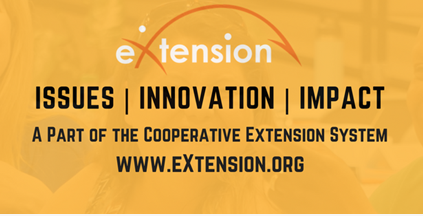
Through eXtension's partnership with the Institute For The Future: Future 50, we are able to provide this unique webinar opportunity to all land-grant universities.
Webinar Date & Time: September 11th, 2 PM EDT
Webinar Description:
As wealth and economic inequality reach staggering heights, we face an urgent future. Inequality at current extremes around the world, including the United States, has historically sparked civil unrest. Now is the time to join together and move us toward a more equitable future.
We must spread as many social fictions imagining a more equitable society as possible into our mainstream imagination, making it common sense that there is an alternative, more equitable future we can build.
As we describe these new social fictions, we'll pre-experience living in these worlds and begin creating them. The world needs futures that create space for many values and authorities to coexist, futures that address and undo systems of exploitation and subjugation, and futures that are locally imagined. From these stories, we can move toward a destination we struggle to imagine. What could a fair and just society actually look like? What could the end of poverty look like? Is there a post-racial future?
The goal of this webinar is to build a common language and shared viewpoint around possible futures and clarify what building a more equitable future requires.
Who should participate:
• A group of people who have a well-defined mission and are actively working together to build a more equitable world.
• A group of diverse stakeholders who want to have a shared conversation about equity.
This webinar will allow for participants to enable their audio and video in Zoom to engage and converse with the facilitators.
Who Can Attend?:
This webinar is available to all land-grant universities.
Register at: https://extension.zoom.us/meeting/register/1c79f6ae06886792dc2040ba88984b7b
This webinar will be facilitated by:
Sara Skvirsky
Research Director
Sara brings a diverse background in the fields of education, community organizing, and social justice advocacy to her work as a researcher for the Institute for the Future's Work+Learn Futures Group. Having spent several years in Latin America and Spain before joining IFTF in 2011, she approaches futures thinking from a deeply global perspective. Sara leads much of IFTF’s future of learning research, working with governments, educational institutions, corporations, foundations, and non-profits around the world to understand the rapidly shifting landscapes of education and work.
Sara is passionate about giving individuals and institutions the tools they need to more effectively think about and prepare for the future. In 2014, Sara developed and launched IFTF’s Foresight Studio, which produces resources and courses to train people in futures thinking and foresight methodologies. She also has been a core member of several projects using IFTF’s massively open online forecasting platform, the Foresight Engine, to engage large audiences in thinking about complex future ideas.
Before arriving at IFTF, Sara worked for Amigos de las Américas in Ecuador, where she managed an international team to establish a youth leadership and community development volunteer program and cultivated partnerships across a wide variety of NGOs. Sara holds a BA in Latin American studies and Spanish from Oberlin College.
Katie Joseff
Digital Intelligence Lab Research Manager
Katie Joseff is the research manager of the Digital Intelligence Lab at Institute for the Future. She works with Sam Woolley investigating computational propaganda-- the use of social bots, disinformation, and algorithms to manipulate public opinion online-- and the ethical implications of emerging technologies. She studied social neuroscience and international security as an undergraduate, and partisanship and disinformation as a master’s student. Her BA and MA are from Stanford University. Her research has been featured in publications such as NPR, ABC News, and Newsweek.
More details at: https://impact.extension.org/